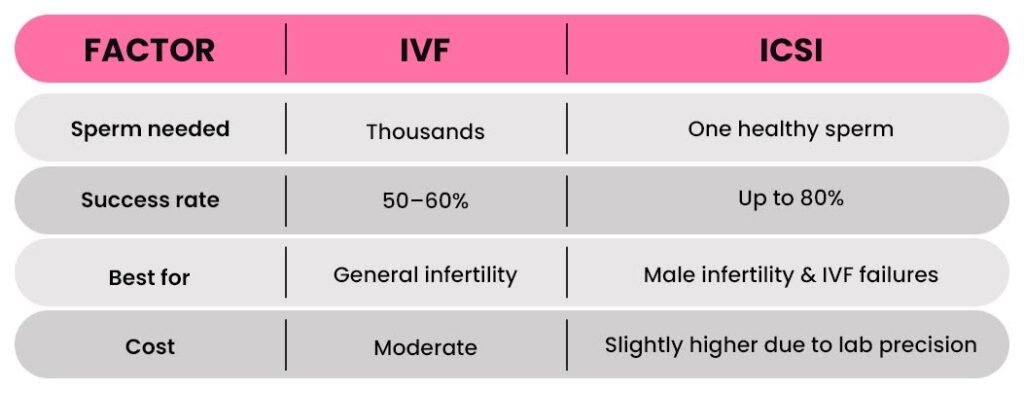Infertility can be an emotionally challenging journey, but advances in reproductive medicine have made parenthood more achievable than ever. Among these breakthroughs, ICSI treatment (Intracytoplasmic Sperm Injection) has become one of the most preferred assisted reproductive techniques for couples facing fertility struggles, especially those who have tried traditional IVF without success.
So, what makes ICSI stand out? Why are more couples turning to it instead of conventional IVF treatment?
Let’s explore in detail.
What Is ICSI?
ICSI (Intracytoplasmic Sperm Injection) is an advanced form of IVF designed to address severe male infertility or fertilization challenges.
While both ICSI and IVF aim to achieve pregnancy through fertilization outside the body, their methods differ.
In traditional IVF, thousands of sperm are placed near an egg in a laboratory dish, allowing one to naturally penetrate and fertilize it.
In ICSI, however, a single healthy sperm is carefully injected directly into the egg using a fine microneedle under a microscope.
This direct approach significantly increases the chances of fertilization, even when sperm quality or count is low, making ICSI treatment a powerful solution for many couples who previously faced failed IVF cycles.
7 Common Reasons Why Couples Choose ICSI Over IVF

Let’s look at the key reasons why ICSI treatment is becoming the preferred choice for couples seeking a successful conception journey.
1. Male Factor Infertility
One of the biggest reasons couples opt for ICSI is male infertility, a condition where the sperm has issues such as:
- Low sperm count (oligospermia)
- Poor sperm motility (asthenozoospermia)
- Abnormal sperm shape (teratozoospermia)
- Presence of antibodies that affect sperm function
In such cases, ICSI treatment ensures that even a single healthy sperm can fertilize an egg, removing the dependency on large sperm numbers or natural motility. This makes it an effective solution for men with compromised semen quality or those who have undergone vasectomy or testicular biopsy.
Learn more about the latest options and success rates in Male Infertility Treatment and how they complement ICSI for better results.
2. Higher Fertilization Success Rates
When compared to traditional IVF, ICSI treatment offers higher fertilization rates because the process bypasses natural barriers like sperm penetration and motility.
In IVF, sperm must reach and penetrate the egg on their own, which isn’t always possible with weaker sperm. But with ICSI, the embryologist directly injects a single sperm into the egg, dramatically increasing the chance of fertilization.
At Asha IVF, our expert embryologists perform ICSI using precision-controlled micromanipulators under advanced microscopes, ensuring every egg is given the best possible chance for successful fertilization.
3. Previous IVF Failures
Many couples turn to ICSI after experiencing unsuccessful IVF cycles. Sometimes, even with good-quality eggs and sperm, fertilization may not occur during IVF due to unknown reasons.
ICSI treatment eliminates these uncertainties by taking control of the fertilization step. Directly injecting sperm into the egg minimizes the risk of fertilization failure, offering renewed hope to couples who previously faced disappointment.
4. Unexplained Infertility Cases
In cases of unexplained infertility, where standard tests show no clear cause, ICSI often acts as a diagnostic and therapeutic solution.
Even when sperm and eggs appear normal, fertilization may still fail in IVF due to subtle sperm-egg interaction issues that standard tests can’t detect.
With ICSI treatment, fertilization is guaranteed at the mechanical level, helping couples overcome hidden barriers to conception.
5. Better Outcomes with Frozen or Low-Quality Eggs
Some women, especially those in their late 30s or early 40s, may have lower-quality or cryopreserved eggs. These eggs can have tougher outer shells (zona pellucida), making it harder for sperm to penetrate naturally during IVF.
ICSI treatment helps overcome this issue by injecting sperm directly into the egg, improving fertilization chances even when egg quality is compromised.
This makes it particularly beneficial for women with diminished ovarian reserve or those using frozen eggs for conception.
6. Precision in Sperm Selection
One of the major benefits of ICSI treatment lies in its precision. Embryologists carefully select a single, healthy sperm based on its shape and motility before injecting it into the egg.
This level of control ensures that only the best-quality sperm are used, minimizing the chances of fertilization with genetically abnormal or weak sperm.
At Asha IVF, our experts use advanced sperm selection techniques like Motile Sperm Organelle Morphology Examination (MSOME) and PICSI to further enhance fertilization outcomes.
7. Advanced Lab Technology and Personalized Care
Not all fertility clinics are equipped with the cutting-edge technology required for ICSI. However, at Asha IVF, every ICSI procedure is conducted in state-of-the-art embryology labs with controlled environments that mimic the natural human body conditions.
What truly sets ICSI apart and why couples prefer it is the combination of advanced technology and personalized care. From sperm selection to embryo transfer, each step is meticulously planned, ensuring higher accuracy and better success rates.
Who Should Consider ICSI Treatment?
While ICSI is an excellent option, it’s not necessary for every couple. It’s best suited for:
- Men with very low sperm count or motility
- Couples with repeated IVF failures
- Cases involving surgically retrieved sperm (TESA, PESA)
- Use of frozen or donor eggs
- Unexplained infertility
- Previous fertilization failure in IVF
At Asha IVF, our specialists assess each couple’s unique situation through detailed fertility evaluations before recommending the best treatment approach, ensuring every step aligns with your personal reproductive goals.
ICSI Success Rate and What to Expect at Asha IVF
The success rate of ICSI treatment largely depends on factors such as the woman’s age, egg quality, sperm health, and the clinic’s expertise.
On average, ICSI offers fertilization rates as high as 70–80%, making it one of the most effective fertility treatments available.
At Asha IVF, our high success rates stem from:
- Expert embryologists with years of specialized experience
- World-class ICSI and IVF lab facilities
- Personalized stimulation and monitoring protocols
- Continuous embryo development tracking
- Compassionate counseling and post-treatment support
Every couple’s journey is unique, and our goal is to make that journey smoother, informed, and filled with hope.
Conclusion
Choosing between ICSI vs IVF can be confusing, especially for couples navigating fertility challenges for the first time. However, with the right guidance, it’s possible to find the treatment that best matches your needs.
ICSI treatment has transformed outcomes for thousands of couples dealing with male infertility, previous IVF failures, and unexplained infertility, giving them a renewed chance at parenthood.
If you’re considering fertility treatment, our team at Asha IVF is here to help you every step of the way.

Frequently Asked Questions (FAQs)
1. Is ICSI treatment more successful than IVF?
While both treatments aim to achieve fertilization, ICSI often results in higher fertilization rates, especially in cases of male infertility or previous IVF failures. However, overall pregnancy rates depend on factors like egg quality, embryo health, and uterine conditions.
2. How long does the ICSI procedure take?
The actual ICSI procedure injecting sperm into the egg, takes only a few minutes per egg. However, the complete process, from ovarian stimulation to embryo transfer, spans around 2–3 weeks, similar to IVF treatment.
3. Are there any risks associated with ICSI?
ICSI is a safe and well-established procedure. Minor risks, such as egg damage during injection or embryo abnormalities, are extremely rare and minimized through advanced lab techniques and expert handling.
4. Can ICSI be used for all infertility cases?
While ICSI treatment can technically be applied to any IVF cycle, it’s generally recommended when there’s a clear indication, such as male infertility, fertilization failure, or poor sperm-egg interaction. Your fertility specialist can help determine if it’s the right choice for you.
5. What’s the difference between ICSI and IVF in simple terms?
In IVF, sperm fertilizes the egg naturally in a dish. In ICSI, one sperm is manually injected into the egg to ensure fertilization, making it more controlled and suitable for complex infertility cases.






